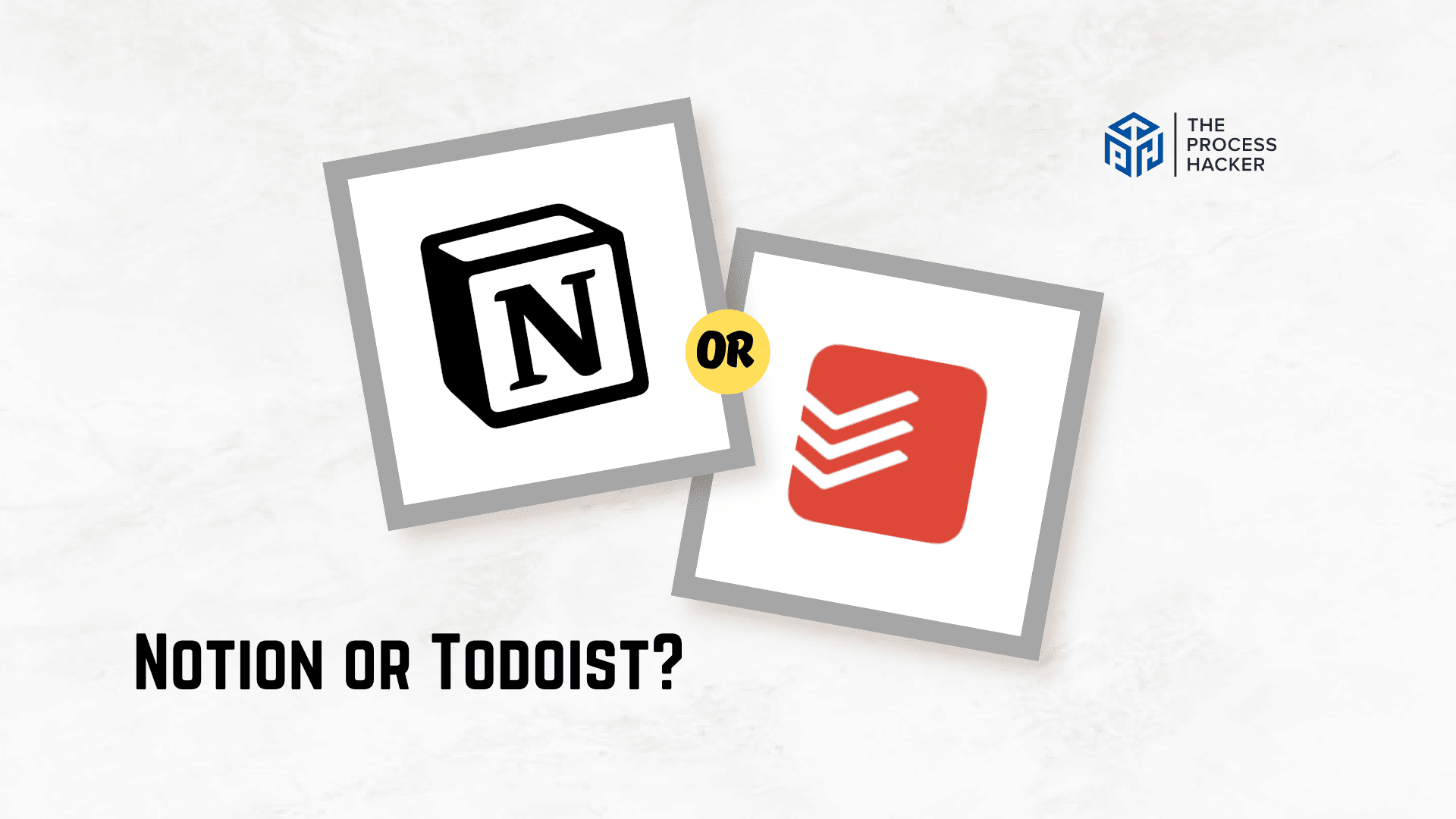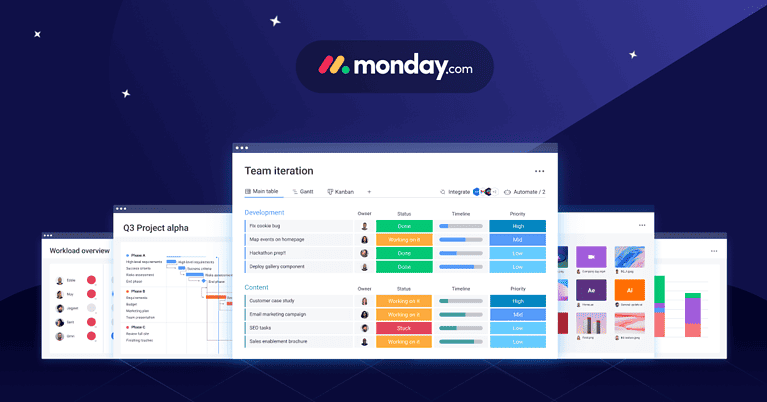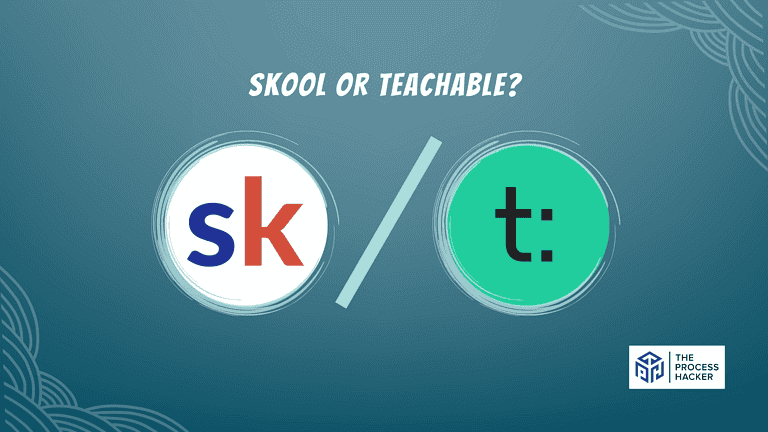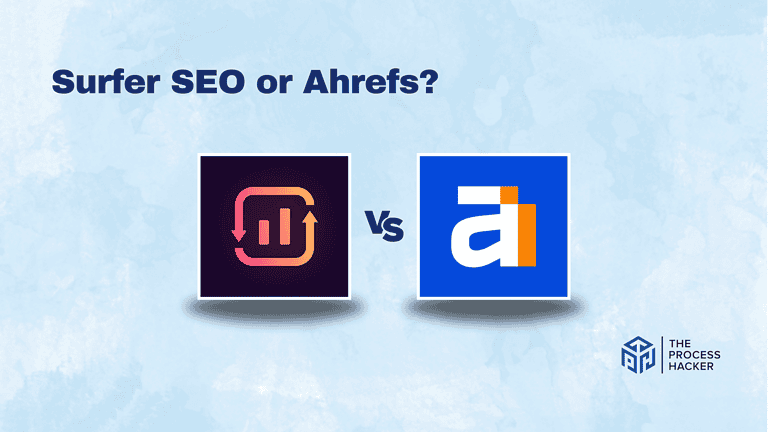Notion vs Todoist: Which Project & Task Management App is Better?
In today’s fast-paced world, managing your projects and tasks is essential to your success, both personally and professionally.
Choosing the right tool can be difficult with so many options, so you’re not alone in struggling to decide between Notion and Todoist.
If you purchase through our partner links, we get paid for the referral at no additional cost to you! For more information, visit my disclosure page.
On the surface, they seem pretty similar; however, after doing hours of research and testing, I’m here to show you their key features, strengths, and weaknesses.
In this blog post, we’ll evaluate both tools against key criteria to help answer the burning question: which project and task management app is better – Notion or Todoist?
Whether you’re a productivity expert or a novice looking to get organized, this article will help you pick the right tool!
Brief Overview: Notion vs Todoist
First, I’ll give you a quick overview of Notion and Todoist:
Notion
Notion is an all-in-one workspace and AI project management tool that helps you get work done, ranging from creating notes and managing projects to organizing databases. Its versatility allows for varied personal and professional use.
Key Selling Points:
- Offers an integrated workspace for notes, tasks, wikis, Kanban boards, and databases
- Variety of customizable pre-built templates for you to jumpstart your projects quickly
- Enables team collaboration with synced updates and commenting features
- You can create custom systems and flexible structures that fit your personal or organizational workflow
- Supports rich content embedding from a range of apps and services, enhancing the utility of each page
Todoist
Todoist is a robust task management app that simplifies tracking tasks and managing projects. It’s designed for individuals and teams seeking straightforward, effective ways to organize and complete their daily tasks and long-term projects.
Key Selling Points:
- Straightforward interface for quick task organization and simplified task management
- Set and manage daily plans or weekly goal tracking to keep productivity levels up
- Syncs across all devices, ensuring you can create to-do lists and tasks are constantly updated
- Share tasks, assign them to team members, and communicate about them within the productivity app
- Works with popular apps to streamline your workflow, from Google Calendar to Zapier
- Automated reminders help you keep track of deadlines and priorities
- Natural language support
Quick Verdict: Notion vs Todoist
Notion is ideal for teams and individuals who need a versatile platform. Unmatched integration of notes, tasks, databases, and wikis into one customizable space. Teams can co-create and share workspaces for seamless collaboration.
The flexibility of its design and structure makes it ideal for building and customizing a digital workspace for different project types and workflow strategies. Its organizational synergy and project visualization benefits outweigh its steeper learning curve.
Todoist shines with its straightforward, user-friendly interface that doesn’t sacrifice functionality. It’s perfect for individuals or professionals who must organize their tasks and priorities quickly and without hassle.
With all the features like scheduled reminders, priority flags, and visual project timelines, you can track your habits and achieve your goals methodically.
Product Overview: Notion vs Todoist
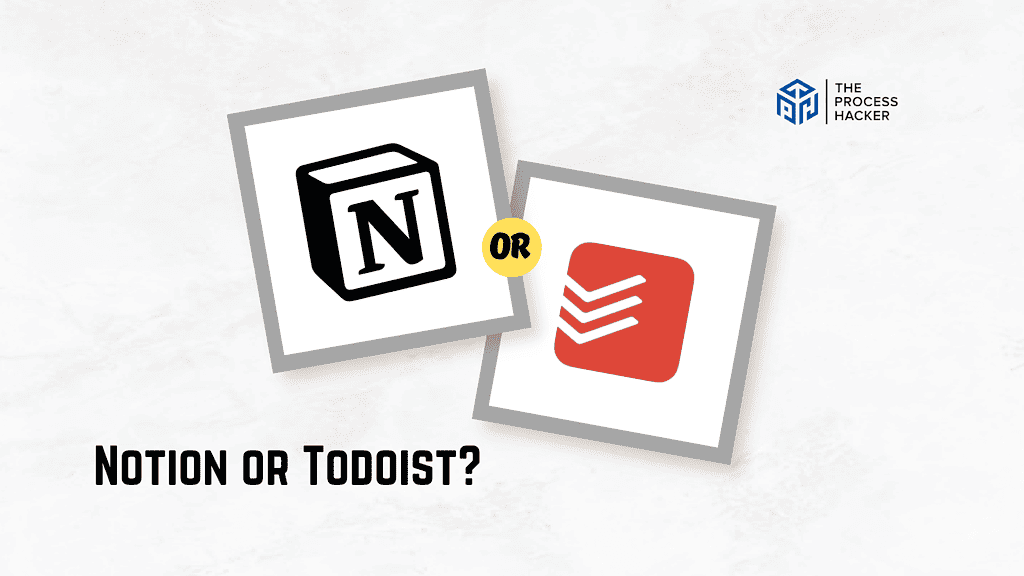
What is it?
Notion is a versatile workspace app that integrates notes, tasks, wikis, and databases. It’s essentially an all-in-one hub designed to help you write, plan, collaborate, AI note-take, and get organized—turning many individual tasks into a cohesive workday.
Todoist is a dedicated task management tool that simplifies to-do lists and project management. It helps you organize your days to live more productively and stress-free by managing multiple tasks and deadlines.
Who is it for?
Notion is best suited for teams and individuals looking for a comprehensive set of productivity tools to manage projects collaboratively. It’s ideal if you appreciate a visually rich environment and want the freedom to customize your digital workspace at a granular level, from simple task lists to complex databases. It is also one of the AI tools for college students to use.
Todoist is perfect for individuals, professionals, and teams who want a straightforward, no-frills approach to managing daily tasks and projects. It’s designed if you need a quick, easy-to-navigate platform that integrates with your daily lives, helping them stay organized and efficient.
What makes it special?
Notion sets itself apart with its sheer customization capabilities. It’s more than a project manager; it’s a robust workspace that can be tailored to various workflows and project styles. With its unique block-based structure, you can create your own knowledge management tools, note-taking, data management, and more.
Todoist stands out for its simplicity and focus on task management. It eliminates the clutter and learning curve associated with more complex systems. With features like recurring tasks, priority levels, and productivity visualizations, it offers a clear and focused way to stay on top of all your to-dos.
What does it do?
Notion provides a flexible environment where teams and individuals can organize work their way, create custom workflows, and collaborate in real-time. It combines elements of relational databases, kanban boards, and document editing features, providing a unique approach to managing projects and knowledge.
Todoist offers a streamlined approach to task management, allowing you to capture tasks as soon as they’re identified, categorize them according to projects or priorities, and track your progress. It integrates with many apps, making it easy to bring your to-do list wherever your digital life exists.
Quick Comparison: Notion vs Todoist
| Key Features | Notion | Todoist |
|---|---|---|
| #1) Pricing | Winner | |
| #2) Free Plan | Winner | |
| #3) Design & Functionality | Winner | |
| #4) Project Management | Winner | |
| #5) Task Management | Winner | |
| #6) Customization | Winner | |
| #7) Collaboration | Winner | |
| #8) Integrations | Winner | |
| #9) Customer Support | Tie | Tie |
| #10) Mobile App | Winner | |
| #11) AI & Automation Tools | Winner | |
| Overall | Business | Personal |
Feature Comparison: Notion vs Todoist
Let’s compare the features of these project and task management apps so you can make the right decision for you and your business.
#1) Pricing
Notion adopts a tier-based pricing model, with its paid plans offering significant upgrades from the free version. At $10 per month, you receive unlimited blocks and file uploads, making it an ideal choice for heavy users who require extensive storage and data management capabilities. The plan also includes a 30-day page history, providing a safety net for retrieving information or tracking changes throughout a project.
Todoist offers a more accessible entry point for individuals and professionals needing enhanced task management features. Its Pro plan, starting at $4 per month, provides you with essentials like unlimited activity history, up to 300 personal projects, and other functionalities that boost productivity and organization.
While both Todoist and Notion provide competitive pricing tiers, Todoist takes the edge regarding affordability, offering a lower starting price for its paid features, which can be especially appealing for individuals or small teams on a budget. However, if you’re seeking an expansive, all-encompassing workspace, Notion’s pricing reflects the extensive utilities and functionalities it offers, making the cost a valuable investment for the right user.
Verdict: For pricing, Todoist wins for its budget-friendly approach, providing essential premium features at a lower monthly cost.
#2) Free Plan
Notion’s free plan is a powerhouse for individual users, providing a comprehensive workspace with a generous offering. It allows for unlimited pages and blocks, which are the core elements of the workspace, and offers a collaborative environment where you can share and co-edit with five guests.
Todoist, however, positions its free plan as an entry point to project control, providing all the basics you need for personal projects like planning a business trip. The free version includes up to 80 active projects and up to 5 people per project, which is generous for individual users or small collaborations.
In comparing the two, Notion’s free version stands out because it offers a more comprehensive set of features for collaboration and content automation creation, making it not just a task manager but a multifunctional workspace. While Todoist offers enough for a simple solution, Notion goes the extra mile in providing a platform for a more extensive range of activities, including knowledge management, project planning, and collaboration.
Verdict: For the free plan, Notion takes the lead. Its offering goes beyond managing tasks, providing a versatile workspace that reduces the need for multiple apps.
#3) Design & Functionality
Notion stands out with its robust design and functionality features. It provides a comprehensive platform to streamline your design workflow. Its design management templates and tools allow you to create and manage design projects, including necessary materials like creative briefs. Additionally, Notion’s design system template helps document design patterns, assets, and brands, making them easily accessible to the team.
Todoist offers a clean, minimalist design that’s easy to navigate. Its functionality is focused on managing tasks, with features like sub-tasks and color-coded priority levels. However, it needs the comprehensive design tools that Notion provides.
In terms of design and functionality, Notion comes out on top due to its extensive design features and flexibility. It provides an all-in-one workspace that can cater to various needs, making it ideal for teams that handle complex projects.
Verdict: For design and functionality, Notion is the winner.
#4) Project Management Tools
Notion’s customizable tools make it an all-in-one workspace that excels at managing projects. Its customizable project tracking templates, intuitive task assignments, Kanban status updates, and detailed documentation like wikis set it apart. Notion lets teams create a custom project hub with project roadmaps and task lists using various modular content blocks.
Todoist manages project tasks. It supports shared active projects, task assignments, priorities, and progress tracking. It works well for daily tasks and simple projects, but it needs more resources and customization, like visual roadmaps and collaborative document editing, for a comprehensive, all-in-one solution.
Notion leads in project management and AI SEO tools. It can manage simple and complex projects due to its wide range of tools and customization. Its comprehensive project planning, tracking, and collaborative content creation make it more versatile and in-depth than Todoist.
Verdict: For project management tools, Notion is the superior choice.
#5) Task Management
Notion’s task management system is flexible and customizable. It allows you to create a custom management system tailored to your team or personal needs. With its various templates, you can manage, organize, and prioritize tasks with ease. Moreover, features like task tracking by importance, category, status, and date provide a comprehensive view of your to-do list.
In contrast, Todoist is built primarily for task, timeboxing, and time management. It offers a more straightforward approach, allowing you to quickly add tasks, set due dates, and prioritize tasks. Todoist also provides features like project-based organization and color-coded priority levels, which make it easy to manage tasks.
Regarding project solutions, Todoist takes the lead due to its simplicity and focus on task-oriented features. While Notion offers more flexibility, Todoist’s streamlined, user-friendly interface makes managing tasks and timeboxing a breeze.
Verdict: For task management, Todoist is the winner.
#6) Customization
Notion stands out for its high level of customization. It allows you to style and customize your content to suit your brand, team, or personal style. From designing aesthetic boards to enhancing the visual appeal of your pages, Notion offers a myriad of options. You can customize pages to your needs, starting with the words on the page.
Todoist offers a more straightforward, task-oriented platform. While it does provide some level of customization, such as color-coding tasks, its customization capabilities are less extensive than Notion’s. The focus of Todoist is more on functionality than aesthetics.
When it comes to customization, Notion has the upper hand. Its extensive customization features allow you to create a workspace that reflects your needs and style.
Verdict: For customization, Notion is the winner.
#7) Team Collaboration
Notion is an excellent workspace for teams to co-create, discuss, and organize everything. It lets multiple users edit, comment, and give feedback on a document or task in real time. The platform’s seamless integration of notes, tasks, wikis, and databases fosters collaboration and information sharing.
While it supports task assignments, comments, and file attachments, Todoist is more of a to-do list than a collaborative workspace. Teams can share tasks and project updates, but the platform needs real-time document editing or a built-in wiki to collaborate on managing complex projects.
Notion excels at teamwork. Its multifunctional, unified workspace outperforms task-based productivity apps. It promotes dynamic collaboration. It is ideal for teams that want to centralize communication, content creation, AI marketing, and project management.
Verdict: For collaboration, Notion emerges as the winner, providing teams with a robust platform for real-time collaboration, content creation, and seamless communication, ensuring every team member is aligned and informed throughout the project lifecycle.
#8) Integrations
Notion offers many integrations that can supercharge your workflow. With Notion, you can connect tools like ClickUp, Google Drive, Google Sheets, and Slack to enhance productivity. You can even create custom integrations with the Notion API, tailoring the platform to your needs. Notion also integrates with over 6000 other apps through Zapier, making it highly versatile.
Todoist, on the other hand, does offer integrations with popular apps like Google Calendar, Dropbox, and Alexa. However, compared to Notion, the number of integrations Todoist provides is relatively limited.
Considering the breadth and versatility of integrations, Notion comes out on top. Its ability to integrate with many apps and its custom integration capabilities make it a powerhouse for enhancing productivity.
Verdict: For integrations, Notion is the winner.
#9) Customer Support
Notion provides a comprehensive help center with various articles and guides to help you navigate the platform. They also offer support via email, promising to respond within a few business days. However, they need more live chat or phone support, which is a drawback for some users.
Todoist also has a robust help center with tutorials, FAQs, and guides to assist you. Like Notion, they provide email support but do not offer live chat or phone support. Their response times are also comparable to Notion’s.
Regarding customer support, it’s a tie between the two. Both Todoist and Notion provide extensive resources to help you and offer email support, but neither offers live chat or phone support.
Verdict: For customer support, it’s a tie between Notion and Todoist.
#10) Mobile Apps
Notion’s mobile app allows you to read, edit, and comment on content. The app is optimized for both iOS and Android devices.
On the other hand, Todoist’s mobile app is highly praised for its simplicity and functionality. Available for both iOS and Android, the app allows you to manage tasks, set reminders, and collaborate with your team from anywhere. The user interface is intuitive, making it easy to stay organized even when you’re away from your desk.
Comparing the two, Todoist’s mobile app offers a better user experience with its simple yet powerful productivity features. While Notion’s app provides basic functionalities, it needs some advanced features that Todoist offers.
Verdict: For mobile apps, Todoist is the winner.
#11) Automation Tools
Notion is not primarily known for its business automation tools, as its main strength lies in AI-powered note-taking and project solutions. However, with its recent updates, Notion has started incorporating more workflow automation features like reminders and specific task automation through third-party integrations. It still requires manual setup and isn’t as intuitive as some competitors. The platform’s versatility, though, supports the integration of external automation tools, broadening its scope. Hence, this is one of the LinkedIn automation tools being used.
Todoist, renowned for its project management capabilities, offers built-in automation features like recurring task setup, reminders, and location-based notifications. Although it provides these functionalities natively, its automation scope is confined mostly within task management parameters, offering fewer avenues for broader, more complex workflow automation.
In weighing the automation capabilities, Notion emerges superior, albeit not for the traditional reasons. While it doesn’t offer extensive native automation features, the flexibility of Notion allows for the integration of powerful third-party automation tools, making it possible to create a highly customized, automated work environment. This is more beneficial if you need extensive, varied automation beyond essential in managing tasks.
Verdict: For automation tools, Notion stands out.
Final Thoughts on Notion vs Todoist
After comparing the features, it’s clear that both Notion and Todoist bring unique strengths.
Todoist shines with its simple and user-friendly task management app, which makes it an excellent choice for personal productivity. It also offers a robust set of advanced features, such as labels, filters, and reminders.
However, if you’re seeking a comprehensive solution for project and task management, especially in a business process context, I prefer Notion. Its powerful features, such as database functionality, page linking, and flexible automation tools, make it a versatile workspace that can adapt to various business needs.
My recommendation?
- If you’re looking for a robust, flexible project management tool to handle diverse business needs, go for Notion.
- But if your requirements are more personal and lean towards a simple task manager, Todoist is a better fit.
Remember, the best tool is the one that fits your needs and workflow. Happy organizing!

